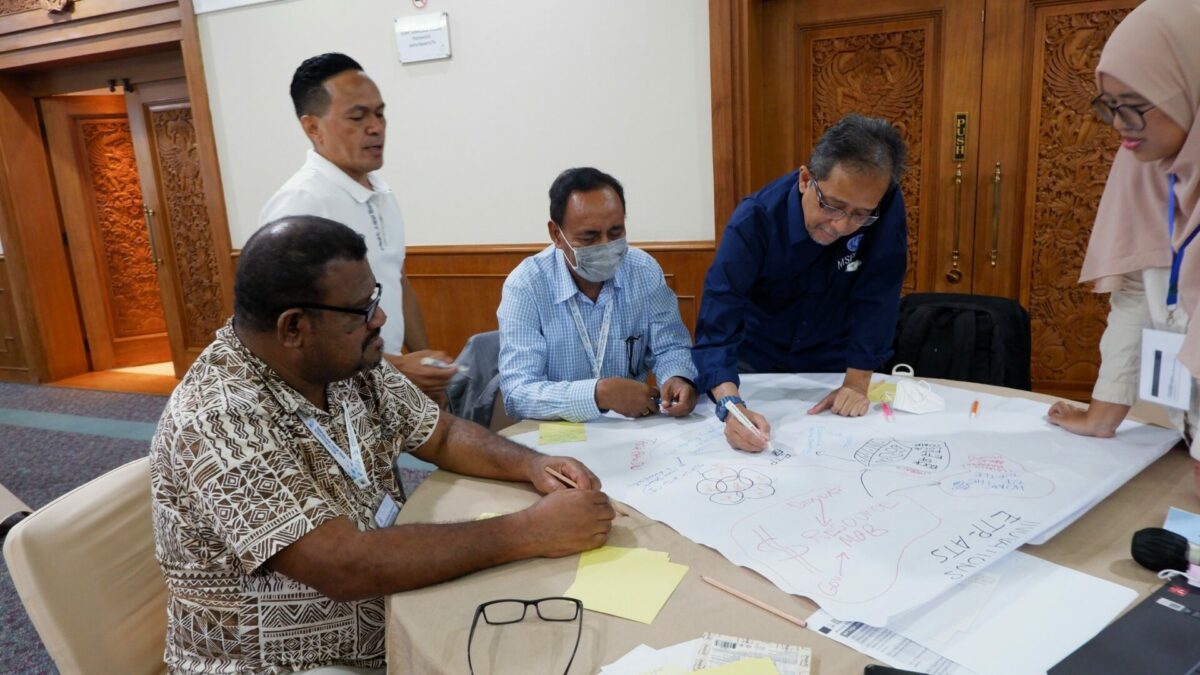From 21-24 February 2023, the Arafura and Timor Seas Ecosystem Action Phase 2 (ATSEA-2) Regional Workshop on Transboundary Diagnostic Analysis (TDA) and Strategic Action Program (SAP) Updating was held in Bali, Indonesia. The workshop brought together 31 participants, comprising National Project Directors (NPDs); Regional and National TDA consultants; TDA-SAP National Working Group (NWG) representatives from Indonesia, Papua New Guinea and Timor-Leste; the ATSEA-2 Regional Project Management Unit (RPMU) members; and National Coordination Unit (NCU) Coordinators. The workshop aimed to elicit feedback on the final draft TDA and commence preparation of the revised SAP, which will be submitted for endorsement of the Regional Steering Committee (RSC) in November 2023.
During his welcoming remarks, Dr Handoko Adi Susanto, ATSEA-2 Regional Project Manager, stressed the need for a shared understanding and agreement on key actions for the finalisation of the updated TDA and updating of the SAP and NAPs during the workshop, which is critical to achieving the project’s targets in the coming months. With the ATSEA-2 Project facilitating the process, Dr Susanto also highlighted that the strategy and program ultimately belong to the four ATS countries who will be implementing them and benefiting from the results.
“Through this joint event, I hope to support and respect each other in agreeing on cross-border issues with a common spirit in strengthening the governance of our waters in the Arafura and Timor Seas (ATS), benefitting the surrounding communities and supporting the sovereignty of our country,” said Yayan Hikmayani, the National Project Director of Indonesia. Hikmayani also emphasised the need for collaboration between governments on technical transboundary matters, such as the issue of abandoned fishing gear, without assigning blame to any specific country. “The document should concentrate on joint action between countries to tackle the issue,” she recommended.
Celestino da Cunha Barreto, the National Project Director of Timor-Leste, shared his optimism for the workshop. “Timor-Leste has tremendous potential for fisheries exploration and development,” he said, drawing attention to the country’s 780 km of coastline and an Exclusive Economic Zone of 77,474 km2. “We are excited to collaborate with our regional partners in crafting a comprehensive SAP and NAP that will sustainably manage our marine resources and improve our quality of life,” he added.
Dr Andrew Chek, the National Focal Point of Australia, also stressed the importance of identifying clear, tractable and focused regional issues to engage with, as well as defining a clear space for ATSEA and its specific role. “Let us be mindful of scope, niche and relationships in developing the future of ATSEA. I look forward to collaborating with all of you over the next four days,” he stated.

The workshop provided a platform for stakeholders to engage in dialogue, share experiences and perspectives and work collaboratively towards achieving environmental conservation and management in the region. The participants identified the most pressing transboundary environmental issues in the region: marine debris; Endangered, Threatened and Protected (ETP) species; Illegal, Unreported and Unregulated (IUU) fishing; and oil spills. They also discussed potential solutions and interventions, including better regulation, improved enforcement and community engagement.
Noan Pakop, the National Project Director of Papua New Guinea emphasised that a good understanding of the socio-economic dynamics at the community level is required to meaningfully address the IUU fishing in small-scale fisheries in the region as a transboundary issue. “This includes identification of the key drivers and taking steps to recognise existing practices and translating them into formalised arrangements to ensure proper data is captured to give better control and monitoring – that’s the bottom line,” he added.
The participants also learned about the SAP methodology and discussed the steps involved in updating the SAP. They agreed on the process and timeline, which involves stakeholder consultation, data analysis and action planning.
Mario Marques Cabral, an expert from Timor-Leste who participated in the workshop, expressed his satisfaction with the outcome. “The workshop exceeded my expectations. I was impressed with the level of attention given to each participating country’s individual challenges and needs, which has led to a more comprehensive and customised approach to sustainable marine resource management,” said Cabral.
The workshop proved to be a significant step towards addressing the transboundary environmental issues in the region. A number of important results were achieved, including final inputs on TDA; identifying leverage points; completing the process of prioritisation for transboundary issues identified in the 2022 draft TDA; clarifying SAP methodology, best practice and expectations; agreeing on SAP structure and presentation; commencing strategic thinking on SAP; and agreeing on next steps, roles and responsibilities in completing the SAP.
Overall, the ATSEA-2 Regional Workshop on TDA and SAP Updating was a productive and collaborative effort towards environmental conservation and management in the region. As Matt Fox, the Regional TDA consultant, pointed out, “this workshop was just the first step in a larger process of developing effective, evidence-based strategies for managing the marine resources of this region. The recommendations made during our time together will serve as a crucial foundation for the future development of the TDA and SAP Updating documents.” The success of this workshop serves as a testament to the importance of regional collaboration in achieving sustainable management of marine resources.
By Ni Luh Putu Yulia Dewi


